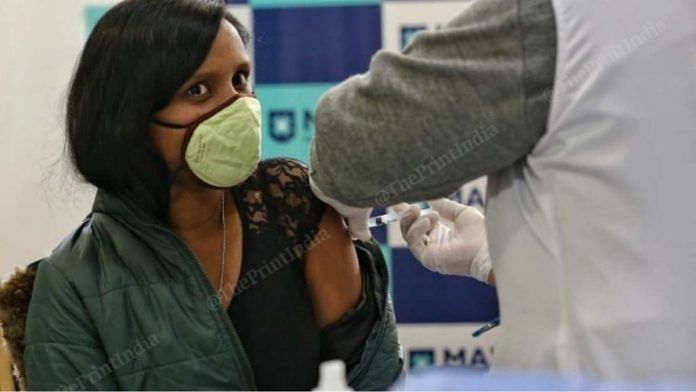New Delhi: The Narendra Modi government Saturday sought to defend its decision to increase the recommended gap between the two doses of Covishield to 12-16 weeks, from the earlier six to eight weeks. The government refuted claims that the decision was influenced by the crippling shortage of vaccines being faced by India at present.
Speaking at the daily press briefing, Niti Aayog member (Health) Dr. V.K Paul said that it is important to respect India’s scientific institutions, and it is sad that there’s this narrative that the decision has been taken under some pressure or because there is a shortage of vaccines.
“It would have suited India, if this was on the basis of shortage (of vaccines). But this is on the basis of science,” Dr. Paul told the media.
Dr. Paul said that the National Technical Advisory Group on Immunisation is a standing committee and has been set up for the purpose of supporting and providing technical guidance to the universal immunisation programme.
The panel had studied data and felt that breakthrough infections increases when vaccine doses are administered within a shorter interval.
“It [the panel] has been there for long. It has guided the introduction to the Rotavirus vaccine [in the past]. It has guided when and which vaccine should be chosen for the pneumococcal vaccination programme,” he said.
Dr Paul added that there are independent scientists, who discuss and take a decision based on a consensus. The decision to widen the gap between two Covaxin doses was a scientific decision, and based on the dynamic pandemic scene that is evolving fast, he said.
Dr. Paul referred to the vaccine trials held by the UK, data from which showed that if the interval between doses is increased to 12-16 weeks, the vaccine efficacy in disease protection is 65-88 per cent.
He said it was seen in the UK that a single dose was seen to be 60-85 per cent effective in disease prevention and that data also showed transmission of the virus was curbed. This, he said, was proved in real life and not in a research setting.
Dr. Paul said this data gave confidence to the country’s scientists to come to this decision.
“Please do not attribute any other reason behind it. I plead with you as a scientist, as a professional. We have to respect our institutions,” he said.
Talking about the production of Covaxin, Dr. Paul said production of 7.5 crore vaccine doses is expected by August.
Currently, he said, 1.5 crore vaccine doses are being produced every month and the aim is to take this to 10 crore.
These, he clarified, are just the figures for the Bharat Biotech vaccine.
Also read: India’s smug civil service officers can learn lot from politicians during Covid: IRS officer
Increasing cases of Mucormycosis
Dr. Paul said emerging new cases of the fungal infections was a new priority and all efforts should be made to limit it.
For instance, as a prevention measure, it should be ensured that oxygen humidifiers are filled with clean, distilled water, so that the fungus doesn’t settle in them, he said.
AIIMS director Dr. Randeep Guleria said there was an increasing number of cases of Mucormycosis. The infection, he said, affects the eye, nose, brain and even lungs.
While this infection had existed in the past and was of low virulence, diabetic COVID patients who are being administered large doses of steroids, stand a bigger chance of contracting this fungal infection.
“The chances of Mucormycosis infection increases in diabetic patients, people with uncontrolled sugar levels and through misuse of steroids,” he said.
He said only at AIIMS, 23 such cases have been reported, while some states have reported 400-500 cases.
Dr. Guleria emphasised on the importance of wearing masks, since the fungus spores can be found in air and on following other hospital infection control practices, to curb the spread of the virus.
According to data presented by the Ministry of Health and Family Welfare, India has 36.73 lakh active Covid cases as of date. There have been 2.66 lakh fatalities.
Karnataka, Maharashtra and Kerala have the most number of active cases, whereas Delhi, UP, Bihar, Maharashtra and Karnataka are among states showing a plateauing of cases.
(Edited by Poulomi Banerjee)
Also read: By the rivers of the heartland & across Vindhyas, proof which politics sucks & which works



